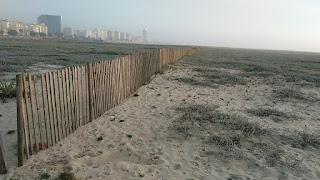Passo a citar um jornalista inglês, Monbiot, resumindo-o em português (tradução livre) :
A malha urbana, o edificado, à nossa volta transforma-nos. Muitos problemas sociais devem-se ao tipo de urbanismo em que mergulhamos diariamente.
As pessoas solidarizam-se e ajudam-se mutuamente com mais frequência em zonas de menor ruído.
Vários estudos mostram que a crescente motorização (maior tráfego automóvel) das cidades enfraquece-as.
We are, to a surprising extent, what the built environment makes us. Academic papers show that many of the problems we blame on individual behaviour are caused in part by the places in which we live. People are more likely to help their neighbours in quiet areas, for example, than in noisy ones(1).
A long series of studies across several countries, beginning in San Francisco in 1969, shows unequivocally that communities become weaker as the volume of traffic on their streets increases(2,3).
www.monbiot.com
References:
1. This was first documented by S Cohen and A Lezak, 1977. Noise and inattentiveness to social cues. Environment and Behavior, 9, 559-572.
2. D Appleyard, 1969. The Environmental Quality of City Streets: The Residents’
Viewpoint. Journal of the American Planning Association, 35, pp. 84-101.
3. Subsequent work on this issue is summarised and reviewed here:
Joshua Hart, April 2008. Driven to Excess: impacts of motor vehicle traffic on residential quality of life in Bristol, UK.
http://www.livingstreets.org.uk/news/uk/-/driven-to-excess
A malha urbana, o edificado, à nossa volta transforma-nos. Muitos problemas sociais devem-se ao tipo de urbanismo em que mergulhamos diariamente.
As pessoas solidarizam-se e ajudam-se mutuamente com mais frequência em zonas de menor ruído.
Vários estudos mostram que a crescente motorização (maior tráfego automóvel) das cidades enfraquece-as.
We are, to a surprising extent, what the built environment makes us. Academic papers show that many of the problems we blame on individual behaviour are caused in part by the places in which we live. People are more likely to help their neighbours in quiet areas, for example, than in noisy ones(1).
A long series of studies across several countries, beginning in San Francisco in 1969, shows unequivocally that communities become weaker as the volume of traffic on their streets increases(2,3).
www.monbiot.com
References:
1. This was first documented by S Cohen and A Lezak, 1977. Noise and inattentiveness to social cues. Environment and Behavior, 9, 559-572.
2. D Appleyard, 1969. The Environmental Quality of City Streets: The Residents’
Viewpoint. Journal of the American Planning Association, 35, pp. 84-101.
3. Subsequent work on this issue is summarised and reviewed here:
Joshua Hart, April 2008. Driven to Excess: impacts of motor vehicle traffic on residential quality of life in Bristol, UK.
http://www.livingstreets.org.uk/news/uk/-/driven-to-excess



Comentários
Enviar um comentário